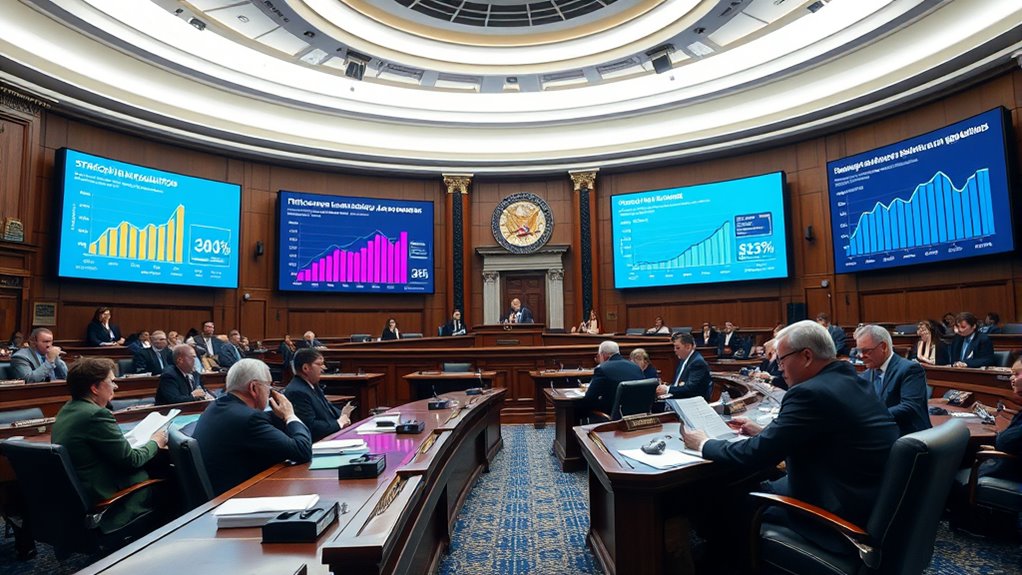Congress is actively debating new laws for stablecoins and crypto exchanges to bring clarity and stability to the industry. These regulations aim to protect investors, ensure transparent disclosures, and create a trustworthy environment for digital assets. By focusing on consumer safeguards and oversight, lawmakers want to support responsible innovation while reducing uncertainty. As the debate continues, you’ll discover how these changes could shape the future of the U.S. crypto landscape and impact your interests.
Key Takeaways
- Congress is actively debating regulations to clarify stablecoin classifications and enforce transparency and reserve requirements.
- Discussions focus on establishing clear rules for digital asset exchanges to ensure consumer protection and market stability.
- Legislation aims to create a balanced framework that fosters innovation while safeguarding investors.
- Regulators emphasize transparency, audits, and security measures for stablecoins and trading platforms.
- The evolving legal landscape seeks to reduce uncertainty and promote responsible growth in the U.S. crypto industry.

Recent developments in U.S. crypto legislation show that regulators are increasingly focused on establishing clear rules for digital assets. This emphasis aims to provide a framework that supports innovation while safeguarding consumers and maintaining financial stability. As a participant in the crypto space, you’ll notice that regulatory clarity is becoming a central goal of policymakers, helping to reduce uncertainty that has long plagued the industry. Clearer rules mean you’ll have a better understanding of what’s legal and what isn’t, enabling you to make more informed decisions when trading, investing, or creating new crypto-based products. This clarity is essential because it can prevent costly legal pitfalls and foster a more predictable environment for growth.
Regulatory clarity in crypto supports innovation, reduces legal risks, and promotes a stable, trustworthy environment for investors.
At the same time, consumer protections are gaining prominence in legislative discussions. Regulators recognize that, without proper safeguards, crypto investors risk losing their money to scams, fraud, or unstable platforms. As Congress debates new laws, you can expect increased emphasis on rules that require exchanges and service providers to implement robust security measures, transparent disclosures, and fair trading practices. These protections are designed not just to shield individual investors but to promote trust across the entire ecosystem. When regulations prioritize consumer protections, you’ll likely see stricter standards for anti-fraud measures and dispute resolution processes, giving you more confidence when engaging with digital assets.
Furthermore, ongoing debates around stablecoins highlight the importance of regulatory clarity and consumer protections. Stablecoins, which are pegged to traditional currencies like the dollar, are seen as indispensable for mainstream adoption. However, without clear rules, their stability and security remain uncertain. Congress is considering legislation that would classify stablecoins more rigorously, ensuring they’re backed by sufficient reserves and subject to regular audits. This approach aims to prevent potential collapses that could harm consumers and destabilize markets. Additionally, the integration of regulatory oversight into the stablecoin space could help foster greater market confidence and stability. As you follow these developments, you’ll see that the push for regulation seeks to strike a balance—supporting the innovative potential of stablecoins while protecting users from systemic risks.
In essence, the push for comprehensive crypto laws reflects a recognition that a well-regulated environment benefits everyone. When regulators focus on creating clear rules and enforcing strong consumer protections, you’ll find it easier to navigate the crypto landscape confidently. These efforts aim to eliminate ambiguity, reduce fraud, and establish a trustworthy foundation for digital assets to flourish in the U.S. economy. As legislative discussions continue, your role as a participant becomes more secure, knowing that a balanced regulatory framework is taking shape—one that promotes responsible innovation and safeguards your interests.
Frequently Asked Questions
How Might Upcoming Legislation Impact Everyday Cryptocurrency Users?
Upcoming legislation could markedly impact you by increasing tax implications, making it clearer how to report crypto earnings and transactions. You might also face heightened privacy concerns as laws could require more transparency from exchanges and users. While these changes aim to regulate the market, you may find it more challenging to keep your transactions private and navigate tax reporting. Staying informed will help you adapt to these evolving legal requirements and protect your interests.
What Are the Potential International Implications of U.S. Crypto Laws?
Your actions could be influenced by U.S. crypto laws through increased international cooperation and cross-border compliance efforts. These laws may prompt other countries to adopt similar regulations, shaping a global framework for cryptocurrency. As a user, you’ll need to stay informed about international standards to guarantee your transactions remain compliant. This evolving regulatory landscape could facilitate smoother cross-border crypto activities but might also introduce new hurdles for global users.
Are There Specific Deadlines for Crypto Regulation Implementation?
You’ll want to know that specific deadlines for crypto regulation implementation vary. Recent reports show that enforcement deadlines for some regulations are set for late 2024, giving industry players a window to adapt. Regulatory timelines are vital, as they impact compliance strategies. Staying aware of these enforcement deadlines ensures you’re prepared to meet upcoming legal requirements and avoid penalties, especially as authorities tighten oversight in the evolving crypto landscape.
How Do These Laws Affect Emerging Blockchain Startups?
These laws impact your blockchain startup by setting clear token standards, ensuring your tokens meet regulatory requirements. They emphasize investor protections, making it safer for users and investors to participate. This can boost trust and adoption, but it also means you need to adapt your platform to comply with new rules. Staying informed and proactive helps you navigate these changes smoothly, positioning your startup for sustainable growth in the evolving crypto landscape.
What Role Will Federal Agencies Play in Enforcement?
Federal agencies will play a key role in enforcement by establishing and applying regulatory oversight and enforcement mechanisms. They’ll monitor compliance with laws, investigate violations, and enforce penalties for non-compliance. This means you’ll need to stay aware of new rules and guarantee your startup adheres to federal standards. Agencies will actively oversee the industry, so understanding their enforcement approaches helps you avoid legal issues and build a compliant, sustainable business.
Conclusion
As Congress continues debating stablecoin and exchange laws, stay informed about these evolving regulations. You should know that over 80% of Americans have some awareness of cryptocurrencies, yet only about 16% actively own them. This gap shows the importance of clear legislation to protect investors and foster innovation. Keeping an eye on these changes helps you make smarter decisions in the rapidly shifting crypto landscape. Stay engaged, and you’ll be better prepared for what’s next.









